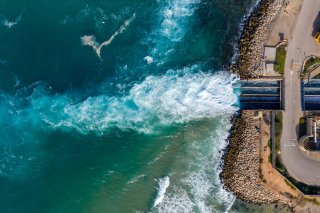Can COP28 Expand Israeli Water for Arab Peace?
Iraq needs water. Israel has mastered desalination and other water-saving methods. Cooperation in this regard could achieve great things.
The top UN Development Program official in Baghdad warned that an increase in global temperature will decrease the fresh water available to Iraqis by 20 percent. Basra, Iraq’s second most populous city, which sits at the confluence of the Tigris and Euphrates Rivers, is already dying of thirst, its water contaminated and its population decreasing.
Israel, too, faces tremendous environmental stress on its water supply, yet has mastered the process of desalination. Its efforts are so successful, it has been pumping desalinated water into its natural reservoir, Lake Kinneret. So advanced is Israeli desalination that former Arizona governor Doug Ducey described the Jewish state as “the world’s water superpower.” Accordingly, the arid southwestern state has awarded Israel contracts to deal with Arizona’s water shortage. Azerbaijan is also an Israeli customer.
Why not Iraq? Water can become the basis for formal peace between Israel and Iraq. The latter could reap the rewards of peace as soon as November when the United Arab Emirates (UAE) hosts the UN climate conference COP28.
At COP27, held in Egypt in November, the UAE brokered a water-for-energy deal between Israel and Jordan. Jordanian farms produce 600 megawatts of solar energy that it exports to Israel, which in turn uses the energy to desalinate sea water and pump it to Jordan, the second most arid country in the world. This water is just one of the benefits that flowed from Amman’s decision to make peace with Israel in 1994.
Iraq is the country fifth most vulnerable to climate change. Suffering through water shortages and sand storms prompted Baghdad to organize a conference last month in which Prime Minister Muhammad al-Sudani promised to plant five million palm trees to combat sand storms. The Iraqi Environment Ministry produced a documentary to spread awareness about global warming, while Iraq’s environmental NGOs—Humat Dijlah (Arabic for “defenders of the Tigris”) and Nature Iraq—have also launched several campaigns.
Yet Baghdad has no ideas on how to solve its water problem, other than having Turkey allow more flow on the Tigris.
Iraq desperately needs Israeli desalination technology, which in turn requires moving toward peace. Instead, Baghdad has been going in the opposite direction, passing an absurd law that punishes with death or life in prison anyone “who places a call to the Zionist entity.” Iraqis loyal to Iran and Qatar even criticized Sudani for participating in the U.S.-sponsored virtual Summit for Democracy because Israeli prime minister Benjamin Netanyahu also took part.
The Iraqi law says that its goal is to “preserve national, Islamic, and humanitarian principles and popular Iraqi wishes in defending Palestine, its people, and all the other Arab peoples whose lands are under [Israeli] occupation.”
Stoking popular resentment of Israel has a long history in Iraq, yet doing so now directly undermines the national interest in a secure supply of water.
Emirati plans include a Water Security Strategy 2036, which aims at reducing water consumption by 21 percent, increase water efficiency, improve water quality by reducing pollution, and achieving “universal and equitable access to safe and affordable drinking water to all by increasing national water storage capacity.” Israeli universities and companies have been involved in jointly researching and achieving further efficiency in water production.
Gulf countries have already been trying to benefit from the Israeli desalination model. Oman hosts MEDRC, a center established in 1996 as part of the Middle East peace process and tasked with finding “solutions to freshwater scarcity.” Members of MEDRC’s executive council include Israel, Oman, and Qatar, even though neither Gulf nation has relations with Israel. Water is indispensable.
Iraq—the second largest oil exporter in OPEC—should follow in the UAE’s footsteps, not only by switching to clean energy, but also by suing for peace with Israel and benefiting from Israeli innovation that can solve Iraq’s water problems.
So far, Iraq seems to be heavily invested in COP28. The Iraqi Embassy in Abu Dhabi has been recruiting young environmental activists to expand the Iraqi delegation at the summit. Just as Jordan benefited at the previous summit, COP28 offers Iraq a golden opportunity to enlist the help of the UAE and Israel in dealing with its thirst problems. The Iraqi government should convince parliament that desalination is a life-or-death priority, so now is the time to make peace.
Hussain Abdul-Hussain is a research fellow at the Foundation for Defense of Democracies (FDD), a Washington, DC-based, nonpartisan research institute focusing on national security and foreign policy. Follow Hussain on Twitter: @hahussain.
Image: Luciano Santandreu/Shutterstock.

